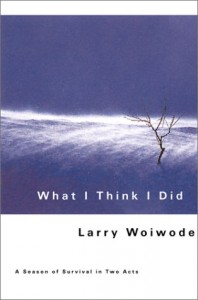
This is not an actual review but a question posed to me about Woiwode’s experience as a novice writer in his book, What I Think I Did.
As a novice writer, I felt such kinship reading about Woiwode’s struggles and triumphs as a writer. There are two statements Woiwode writes that encapsulate the hurdles of a young writer, because the search for words in a beginning writer is as elusive as the search for physical expression (p.209) and What a writer often needs, and especially a beginner, is an answer to technical difficulties. (p.259) Woiwode definitely got an amen from me as I read those passages. I find that as I write, or in many cases try to write, I am searching for those words that easily slip off my tongue but find difficulties finding their way home on a blank page. Forget horror movies, a blank page is the scariest thing for me. Then there are the questions that creep up, the technical ones. I can see the image in my head but how do I translate that image to words with the same technicolor magic? I feel that I often overkill with details and as Scouffas tells Woiwode I over-reach. But on the flip side, I feel that if I simplify things then I’m losing the intensity of the scene.
I think we all unilaterally regressed back when we read the passage about Woiwode’s experience of rejection when he turned in his first writing submission. I’m breathless, as eager amateurs are, though they have the confidence of peacocks in displaying themselves€ (p.124) It’s doesn’t matter whether it’s your first rejection or your tenth one, the sting still hurts. Even as a more experienced writer, Woiwode received harsh but critical reviews, Larry, either my judgment is failing me or this the worst thing you’ve ever written. (p. 186) Ouch. But as the old adage goes, what doesn’t kill us, makes us stronger. I could write a book on rejection and feelings of inadequacies. Hmmm…
I think the best advice given to Woiwode on learning how to write is the ever-present question, Isn’t there a simpler way of saying that. (p.259) For me, this has become my mantra, my chant, and my meditation. As I am learning the nuances of good writing, I find that the Zen approach to writing, less is more, is pervasive. You don’t have to look no further then Tobias Wolff’s This Boy’s Life for a beautiful example. What I’m struggling with is finding the balance, trying to get my point or the image across like a haiku but without losing the intensity of emotions. More often than not, I feel as I edit my work, I feel as if I losing my children in the process. I just got to learn to let go.


